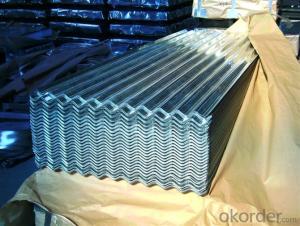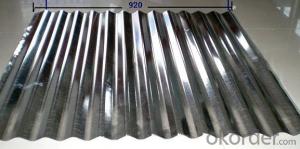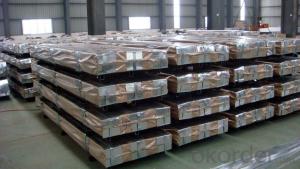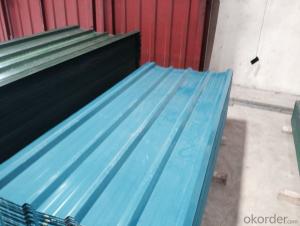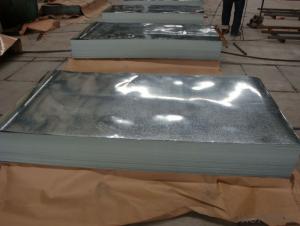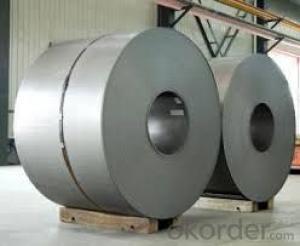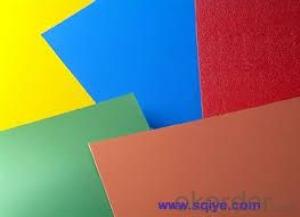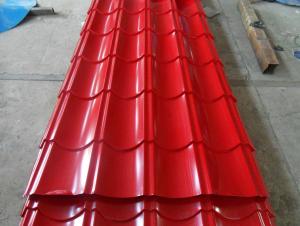Galvanized Corrugated Steel Sheet in High Quality
- Loading Port:
- Shanghai
- Payment Terms:
- TT OR LC
- Min Order Qty:
- 100 m.t.
- Supply Capability:
- 10000 m.t./month
OKorder Service Pledge
OKorder Financial Service
You Might Also Like
Hot-dip Zinc Coating Steel Building Roof Walls
1.Structure of Hot-Dip Galvanized Steel Sheet Description:
Hot-dip galvanized steel coils are available with a pure zinc coating through the hot-dip galvanizing process. It offers the economy, strength and formability of steel combined with the corrosion resistance of zinc. The hotdip process is the process by which steel gets coated in layers of zinc to protect against rust. It is especially useful for countless outdoor and industrial applications. Production of cold formed corrugated sheets and profiles for roofing, cladding, decking, tiles, sandwich walls, rainwater protective systems, air conditioning duct as well as electrical appliances and engineering.
2.Main Features of the Hot-Dip Galvanized Steel Sheet:
• Excellent process capability
• Smooth and flat surface
• Workability, durability
• Excellent anticorrosive property
• High strength
• Good formability
• Good visual effect
3.Hot-Dip Galvanized Steel Sheet Images
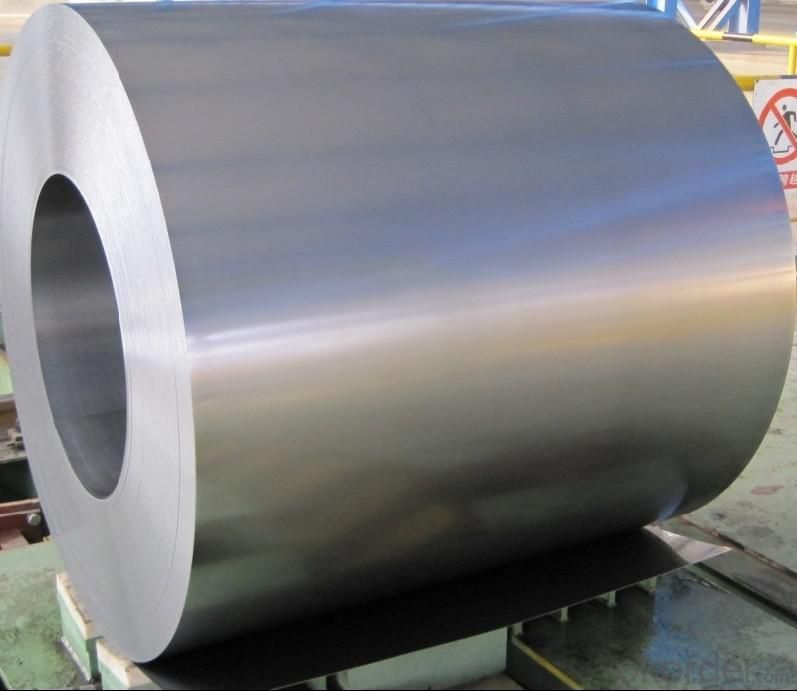
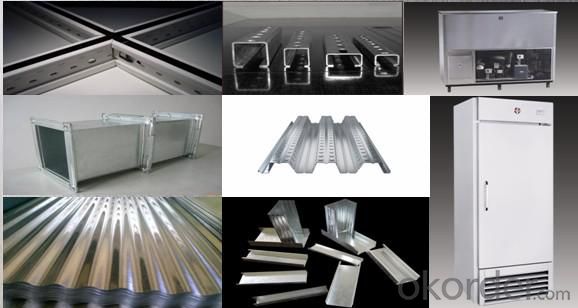
4.Hot-Dip Galvanized Steel Sheet Specification
Standard: ASTM, JIS,EN
Grade: CS, DX51D+Z,SGCC, SS 230~550,S220GD+Z~S550GD+Z, SGC340~SGC570
Thickness: 0.1mm~5mm
Width: max 2000mm
Coil weight:3-12 MT
Coil ID:508/610mm
Surface structure: zero spangle, regular spangle or minimum spangle
Surface treatment: Chromate treatment, Oiled/dry, skinpassed/non-skinpassed
Packing: Standard seaworthy export package
Technology test results:
| Processability | Yield strength | Elongation % | Elongation % | 180°cold-bending |
| Common PV | - | 270-500 | - | d=0,intact,no zinc removal |
| Mechanical interlocking JY | - | 270-500 | - | d=0,intact,no zinc removal |
| Structure JG | >=240 | >=370 | >=18 | d=0,intact,no zinc removal |
| Deep drawn SC | - | 270-380 | >=30 | d=0,intact,no zinc removal |
| EDDQ SC | - | 270-380 | >=30 | d=0,intact,no zinc removal |
5.FAQ of Hot-Dip Galvanized Steel Sheet
We have organized several common questions for our clients,may help you sincerely:
1.How to guarantee the quality of the products?
We have established the international advanced quality management system,every link from raw material to final product we have strict quality test;We resolutely put an end to unqualified products flowing into the market. At the same time, we will provide necessary follow-up service assurance.
2. How long can we receive the product after purchase?
Usually within thirty working days after receiving buyer’s advance payment or LC. We will arrange the factory manufacturing as soon as possible. The cargo readiness usually takes 15-30 days, but the shipment will depend on the vessel situation.
- Q:What are the different types of steel sheet coatings available?
- There are several types of steel sheet coatings available, including galvanized, galvalume, tinplate, and stainless steel coatings. Each type offers different properties and advantages depending on the specific application and requirements. Galvanized coatings provide excellent corrosion resistance, galvalume coatings offer enhanced durability and heat reflectivity, tinplate coatings provide superior solderability and food-grade suitability, while stainless steel coatings offer exceptional resistance to corrosion, heat, and staining. The choice of coating depends on factors such as the environment, intended use, and desired performance of the steel sheet.
- Q:Are steel sheets resistant to vibrations?
- Yes, steel sheets are generally resistant to vibrations due to their high strength and stiffness.
- Q:Are the steel sheets suitable for water tank fabrication?
- Steel sheets are indeed appropriate for the fabrication of water tanks. Due to their strength and durability, steel can tolerate the pressure exerted by water and offer vital structural reinforcement. Moreover, when adequately coated or treated, steel proves resistant to corrosion, thereby guaranteeing the purity and unspoiled nature of the stored water. Additionally, steel sheets are highly malleable and can be effortlessly shaped and molded to meet precise design specifications for water tanks. Consequently, steel sheets emerge as a dependable and widely employed material choice for the construction of water tanks.
- Q:What are the common sizes of steel sheets?
- Common sizes of steel sheets vary depending on the industry and application, but some standard sizes include 4x8 feet (1.2x2.4 meters), 4x10 feet (1.2x3 meters), and 5x10 feet (1.5x3 meters). Other sizes may also be available depending on the manufacturer and customer requirements.
- Q:What industries commonly use steel sheets?
- Several industries commonly use steel sheets, including construction, automotive, aerospace, manufacturing, and shipbuilding.
- Q:Can steel sheets be used in the energy sector?
- The energy sector can indeed make use of steel sheets. Steel, being a versatile material, offers numerous advantages for different applications in the energy industry. It finds common usage in the construction of power plants, transmission towers, and infrastructure for renewable energy sources like wind turbines and solar panels. Power plants employ steel sheets in fabricating boilers, turbines, and other components. Steel's high strength and durability make it suitable for withstanding the high temperatures and pressures involved in power generation processes. It also possesses resistance to corrosion and erosion, ensuring the longevity of critical equipment. Transmission towers and substations also rely on steel sheets for their construction. These structures support power transmission lines and aid in the efficient flow of electricity across long distances. Steel's robust mechanical properties make it an ideal choice for such applications, as it can withstand the weight and stresses imposed by power transmission infrastructure. Moreover, steel sheets play a vital role in the manufacturing of wind turbines and solar panels. In wind turbines, steel is used for the tower structure, which must possess sufficient strength to support the rotor's weight and endure the wind forces. Additionally, steel sheets are utilized in constructing solar panel frames, providing stability and rigidity to the photovoltaic modules. All in all, steel sheets are extensively utilized in the energy sector due to their strength, durability, and resistance to various environmental factors. The versatility of steel makes it a dependable choice for a wide range of applications, contributing to the generation and transmission of energy from both conventional and renewable sources.
- Q:What is the price range of steel sheets?
- The price range of steel sheets can vary greatly depending on factors such as the type of steel, thickness, size, and market demand. It is advisable to check with suppliers or conduct research to get specific and up-to-date pricing information.
- Q:Are the steel sheets resistant to impact or denting?
- Yes, steel sheets are highly resistant to impact and denting. Steel is known for its exceptional strength and durability, making it one of the most reliable materials for various applications. The inherent properties of steel, such as its high tensile strength and toughness, provide excellent resistance against impact and denting. Additionally, steel sheets can be further enhanced with special coatings or treatments to increase their resistance to impacts or dents, making them even more reliable in demanding environments. Overall, steel sheets are a preferred choice for applications where impact resistance and denting are significant concerns.
- Q:How do steel sheets compare to other materials in terms of durability?
- Compared to other materials, steel sheets are widely acknowledged for their exceptional durability. The long-lasting nature of steel can be attributed to its unique qualities, including high tensile strength and resistance to corrosion. Unlike wood or plastic, steel sheets are not easily susceptible to wear and tear, making them the preferred choice for various applications that require durability. Construction projects, automotive manufacturing, and industrial applications all benefit from the ability of steel sheets to withstand heavy loads without bending or warping. Furthermore, steel sheets have a longer lifespan than other materials, reducing the need for frequent replacements and maintenance. In summary, the durability of steel sheets is unparalleled, making them a dependable and cost-effective option for many industries.
- Q:Can steel sheets be used for transportation equipment?
- Yes, steel sheets can be used for transportation equipment. Steel is commonly used in the automotive industry for manufacturing various components such as body panels, frames, chassis, and other structural parts due to its high strength, durability, and impact resistance. It is also utilized in the production of trains, ships, and aircraft, making it a versatile material for transportation equipment.
1. Manufacturer Overview |
|
|---|---|
| Location | |
| Year Established | |
| Annual Output Value | |
| Main Markets | |
| Company Certifications | |
2. Manufacturer Certificates |
|
|---|---|
| a) Certification Name | |
| Range | |
| Reference | |
| Validity Period | |
3. Manufacturer Capability |
|
|---|---|
| a)Trade Capacity | |
| Nearest Port | |
| Export Percentage | |
| No.of Employees in Trade Department | |
| Language Spoken: | |
| b)Factory Information | |
| Factory Size: | |
| No. of Production Lines | |
| Contract Manufacturing | |
| Product Price Range | |
Send your message to us
Galvanized Corrugated Steel Sheet in High Quality
- Loading Port:
- Shanghai
- Payment Terms:
- TT OR LC
- Min Order Qty:
- 100 m.t.
- Supply Capability:
- 10000 m.t./month
OKorder Service Pledge
OKorder Financial Service
Similar products
New products
Hot products
Hot Searches
Related keywords
